Jevon Albert "Jeff" Nicklin, was the son of Percy Harold and Eva Louise Nicklin and husband of Mary Eileen Nicklin, of Port Credit, Ontario. Before enlistment 'Jeff' was an all-star with the Winnipeg Blue Bombers and was part of the team's Grey Cup victories in 1935 and 1939. He cut short his successful football career to enlist with the Royal Winnipeg Rifles.
After volunteering for airborne forces, he was posted to the newly formed 1st Canadian Parachute Battalion in 1942. As Deputy CO to G.F.P. Bradbrooke, Nicklin had a reputation as a tough disciplinarian, whose physical fitness was second to none. He applied the same rules to everyone whether they were a Company Commander or a Private. In one story, he "punished officers who tried to sneak out of the two-mile morning runs by turning them over to the regimental sergeant-major (RSM) for punishment drill on the parade square". Lt. William Jenkins described him as "tough, very tough, but he would not ask anything of anybody that he would not do himself". For Nicklin, sports days were "not a holiday for certain personnel to be sitting around, lolling in the sun". Needless to say, his methods meant that Nicklin "wasn't really popular" according to Private Morrison. But Sergeant Feduck counters, "he was very strict...but he was a real paratrooper". Medical Officer Colin Brebner merely suggested that "he expected everyone to be as strong and as fit as he was...he'd drive them to the limit".
Just before the Canadians left for England, they were inspected by Major-General J.P. Mackenzie in July 1943. He praised the synergy of Bradbrooke and Nicklin, describing the former as "a very efficient officer - energetic with plenty of imagination" and the latter as "a good leader and as a Training Officer, thoroughly satisfactory".
Nicklin saw active service on Operation Overlord in Normandy, one of the first to land in Normandy on D Day and his leadership led to him being Mentioned in Despatches. Often in the front line, Nicklin was injured on July 23, 1944, after triggering an improvised mine which left him with shrapnel in his arms and legs. After his evacuation, Fraser Eadie took over as Deputy CO.
Lieutenant Colonel Nicklin took over command of 1st Canadian Parachute Battalion on September 8, 1944 and ‘by sheer determination, enthusiasm and great devotion to duty he raised the efficiency of the Battalion as a fighting unit to a very high level’. He inherited the role from Eadie who had been CO on a temporary basis, owing to Bradbrooke's departure. Brigadier Hill was a particular admirer of Nicklin's leadership style, calling him,
"An officer of the highest integrity who possesses unusual drive and determination. He sets a very high standard in the Battalion and is prepared to accept no compromise. He is a stern disciplinarian, but takes infinite trouble to safeguard the welfare of the men. He is a good trainer of troops and is tactically sound in his ideas. He requires further experience in the tactical handling of his Battalion".
Hill wanted him to reimpose discipline on the battle-hardened men, later saying, "Here we have tough chaps, heroes. They had to be disciplined. So, I popped in Jeff Nicklin". However, not everyone agreed with the changes, particularly as Nicklin's predecessor Bradbrooke had been more lax about the rules. Private Morrison again states his opinion that "[Nicklin] was too strict and over did it with discipline...he would toss people out or charge them for very slight problems". Roland Larose remembered with distaste when Nicklin got underperforming Paras "to wear a smock with a big yellow stripe down their back. That really cheesed us off. You can only push a guy so far...They weren't yellow, that's the part we didn't like". Sergeant Ronald Anderson adds that "the number of soldiers punished severely for what might be minor infractions gave the colonel the unkind title of 'Tyrant'". Even Lt Col Eadie remarked "Nicklin's attitude was simply to charge to the hilt those who did not comply with his regulations or orders". The Battalion historian suggested that "the men were for a time in a very unsettled state, perhaps due to sudden release from the tension of the summer months' fighting".
Things came to a head when a hunger strike began on October 20, 1944. The War Diary recalled "One evening supper parade great confusion was caused when the men refused to eat. The complaint lay not in the food but in the treatment of the men by the commanding officer". Captain John Madden summarised the quarrel: "the men saw it as chickenshit...they knew that so many of the manifestations of this parade square discipline were unessential to getting the job done in war". On the other hand, Jan de Vries remembered that "many paratroopers were uncomfortable with this course of action [the hunger strike]. We were put in a position that we had to show solidarity and go with the flow".
It was only the intercession of Brigadier Hill, who was so greatly admired by the Canadians, that ended the strike. The six ringleaders later apologised to him personally and he gratefully accepted: "I accepted their apologies and thanked them very much for coming in. I always loved those Canadians and that made me love them more and more". Both Hill and Major-General Gale agreed that "the main cause [of the strike] was the slightly excessive enthusiasm for perfection in disciplinary matters by the CO" and concluded that "the CO's appreciation of the disciplinary situation is cured". But this was probably not true, as Nicklin had never really backed down.
However, Nicklin was not merely the Battalion's "Tyrant". Lt. Jenkins presents another side of Nicklin in a series of anecdotes:
"A week before D-Day, Jeff recognized that the troops were very apprehensive and down in spirit; they were somber and obviously worried about that which was ahead of them in the next week. They had never been in battle before and they knew this was going to be a tough assignment.
Jeff became aware of all their feelings and he wanted to do something to get their minds into a more pleasant state. He called RSM and enquired if the NCOs would like a game of [Canadian] football...In the first play of the game, Jeff took the ball and was making a wide end run...With Jeff weighing about 220 pounds coming at full speed, the sergeant threw himself down in front of his opponent. Jeff tripped over him, went flying through the air, landed on his right side and broke his shoulder blade; that of course, was the end of the game and we rushed him off to hospital.
...Five days later, Jeff led the Battalion on a parachute invasion into France and stayed with his troops throughout the entire campaign. This was the real Jeff Nicklin".
[...]
"A week or so after returning to Carter Barracks, Jeff called me to his office and gave me something in the order of the following instructions: "I want you to take my staff car, choose a friend to accompany you, purchase a load of sweets, cigarettes, fresh fruit and anything else you think our wounded men would appreciate. Find out all the hospitals to which our men were sent and if there is anything they require. Give each one my warmest regards and express my personal appreciation to them for their tremendous efforts". Tom Jackson and I had a very satisfying trip and we were pleased to represent our commanding officer. This was the real Jeff Nicklin".
[...]
"On our return to Bulford and Carter Barracks. the Battalion began to prepare for the Rhine crossing. However this operation was put on hold because we were assigned to go to Belgium...[Jeff] knew that on the day before Christmas the Battalion would move down to Folkestone to embark on the S.S. Canterbury and sail across to Ostend. Therefore he ordered the usual Christmas dinner for the entire Battalion. Here was the occasion where Jeff and his officers served the men. This turned out to be a really great party - enjoyed by everyone especially the real Jeff Nicklin"
Nickin's second operational jump was on Operation Varsity (The Rhine Crossing) on 24 March 1945. Lt Col Nicklin’s chute got caught in trees on landing and he was either shot as he hung there, or had already died and come to rest in the trees. Private Jan DeVries posits that "Nicklin was actually probably dead before he came into the trees because he sailed right over a German machine-gun". Lt Jenkins was traumatised by the event, writing, "as Jeff was descending, a gust of wind carried him into the woods and into a large tree. He was shot fifteen feet above the ground with a barrage of machine gun bullets spread across his middle. Seeing Jeff there, in that state, was a sight I shall never forget - it turned my stomach. I was almost ready to quit. This was certainly the worst day in my military career. I knew where Major Fraser Eadie had landed so I reported this gruesome incident to him. At that moment, he became the Commanding Officer of the Battalion". Nicklin's body was recovered two days later and he was given a field burial conducted by Captain Douglas Candy, Padre with 1st Canadian Parachute Battalion. The war diary stated "it was not until 26 March that the body of Lt-Col Nicklin was found hanging from a tree in his parachute".
Lt Col Nicklin was awarded The Most Excellent Order of the British Empire (OBE) which was announced in The London Gazette on 10 July 1945. His citation can be seen opposite.
Lt Col Nicklin was Killed in Action on 24 March 1945, aged 30 years old and is now buried at Groesbeek Canadian War Cemetery, near Arnhem. Lt. Col. Eadie again took over as CO of the Battalion after Nicklin's untimely death.
After the war, the 1st Canadian Parachute Battalion Association created the Jeff Nicklin Memorial Trophy which is awarded by the Canadian Football League to the most outstanding player in the Western Conference.
By Wendy George with information Robert Campbell
Additional editing from Alex Walker
With additional information from:
Obituary of Fraser Eadie by John Ward, August 15, 2003
'Bradbrooke, Nicklin and Eadie: A Tale of Command', Bernd Horn in Intrepid Warriors: Perspectives on Canadian Military Leaders (Kingston, 2007), (ed.) Bernd Horn, pp. 223-247
The Maroon Beret, summer 2008
Read More

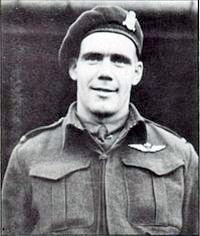
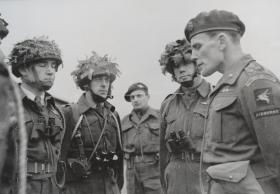
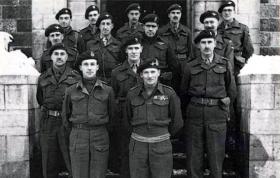
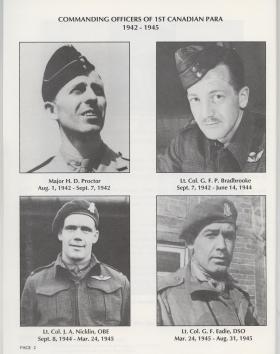
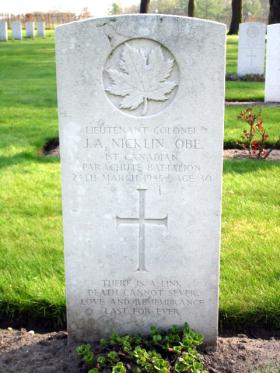
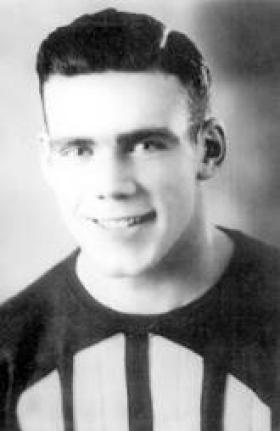
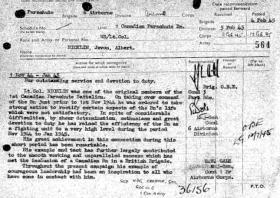
Latest Comments
There are currently no comments for this content.
Add Comment
In order to add comments you must be registered with ParaData.
If you are currently a ParaData member please login.
If you are not currently a ParaData member but wish to get involved please register.